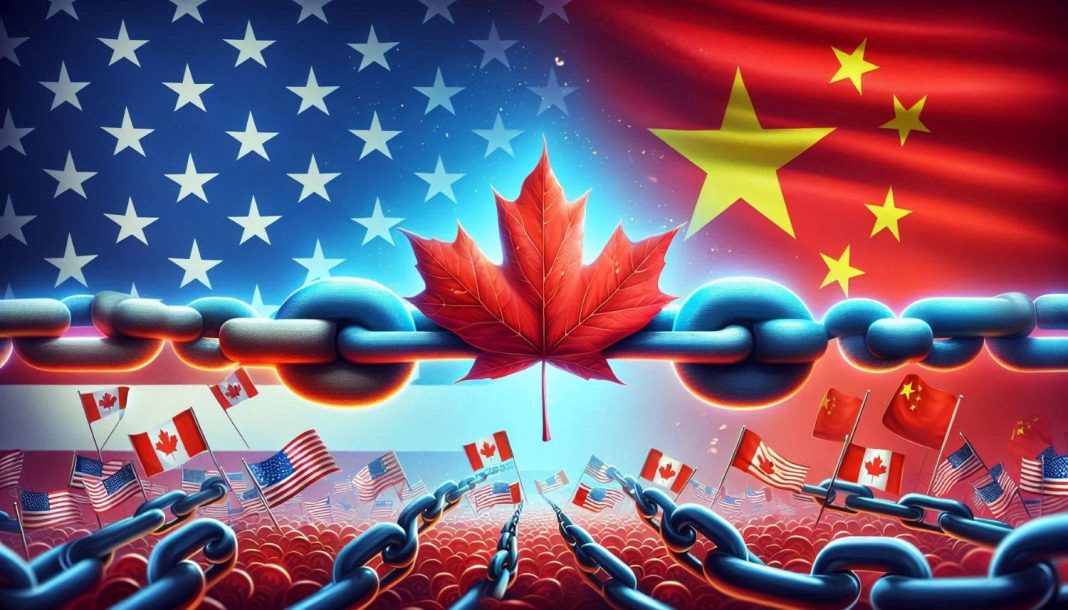Some pundits suggest that annexation rhetoric and threats of disproportionate tariffs from the United States against Canada is a classic example of a stalking horse, and simply a tactic out of Donald Trump’s book, The Art of the Deal.
A stalking horse is a ploy to gain, through leverage, a favorable outcome without showing your high cards.
In this article, I explore the idea that the more favorable outcome sought by the U.S. from its northern neighbour is one that will see the Canadian government agree to formally address deeply rooted organized crime operating within its borders and specifically its ties to the People’s Republic of China (PRC).
The hypothesis is that by threatening Canada’s economic viability and sovereignty, Washington aims to have Ottawa finally deal with the multi-national drug cartel (triad) money-laundering enterprises known to be operating within Canada for more than two decades.
Canada wants to be sovereign, while U.S. wants long-term security assurances along its northern border.
Remember, the 30-day grace period on the near-blanket 25% tariff came with the promise that Canada’s governing Liberals would appoint a “fentanyl czar”, who would co-operate with the U.S. in rooting out organized crime, together with deploying 10,000 border security agents.
The same was demanded of Mexico.
The basis of my hypothesis:
On October 10, 2024, the U.S. Department of Justice (DOJ), the Treasury Department’s Financial Crimes Enforcement Network (FinCEN), the Federal Reserve Board, and the Office of the Comptroller of the Currency (OCC) announced about US$3 billion in fines against Canada-based Toronto-Dominion Bank for laundering more than US$670 million for Mexican, Colombian, and Chinese drug cartels and triads between 2018 and 2024.[1]
“TD Bank created an environment that allowed financial crime to flourish. By making its services convenient for criminals, it became one,” U.S. Attorney General Merrick Garland said in remarks regarding TD’s guilty plea.
TD Bank pled guilty to laundering drug money in the United States following a series of investigations and legal actions that highlighted significant failures in its anti-money laundering (AML) practices.
Reports indicated that TD Bank had “long-term, pervasive, and systemic deficiencies” in its transaction monitoring systems. During this period, more than 90% of transactions went unmonitored, showcasing a severe lack of compliance with AML laws.
One example cited by Garland: “… five TD Bank employees conspired with criminal organizations to open and maintain accounts at the bank that were used to launder $39 million to Colombia, including drug proceeds.”
Bharat Masrani, CEO of TD Bank, acknowledged the bank’s failures in its AML program, stating that the bank would take full responsibility and make necessary changes.
The recent announcement that Canada would designate Mexican cartels as terrorist organizations was part of the deal that delayed tariffs on Canada, CBC reported.[2] There is no official indication to date that multinational actors such as Iranian crime groups or Chinese triads operating in Canada will also be designated as terrorists.
The idea that fentanyl precursors are known to largely originate in China seems to be ignored at this late hour of negotiations with the U.S.[3]
Canada’s equivalent to FinCEN, the Financial Transactions and Reports Analysis Centre of Canada (FINTRAC) imposed in April 2024 a $9.185-million fine against TD Bank for its failures to have sufficient AML controls and suspicious transaction-reporting practices.
This fine was the biggest penalty ever slapped on a Canadian financial institution by FINTRAC, and coming just six months before the US DOJ’s case was finalized suggests the problem is pervasive on both sides of the border.[4]
Note that FINTRAC had fined the Canadian Imperial Bank of Commerce (CIBC) and the Royal Bank of Canada (RBC) $9 million in December 2023 for failing to submit suspicious transaction reports, the first time it had taken such action.
Are Canada’s largest banks actively engaged in cartel (triad) money laundering?
Where there is smoke, there is all too often fire.
It is an understatement to say that the absence of a broader formal criminal investigation does not look good for Canada.
Note that the idea of an official blind eye at the federal level being turned to organized crime money laundering in Canada is nothing new. Beyond the banking industry, other known participants include the real estate and casino sectors.
The “Vancouver model” is a term used to describe a sophisticated money laundering scheme in which drug proceeds, often linked to the opioid trade, are converted to casino chips, which are then used in gambling activities and cashed out as “clean” money.
Investigative reports and official inquiries have detailed how this model was used by Chinese triads and other criminal organizations to launder money through the Canadian province of British Columbia’s (B.C.) casinos. The scheme involves bringing large sums of cash – often in $20 bills, a common denomination for drug transactions – into casinos, purchasing chips, and then cashing out after minimal gambling to legitimize the funds.[5]
Two independent reports and commissions tasked with investigating this risk and these are the Peter German’s Reports[6] and the Cullen Commission.[7]
Peter German, a former RCMP officer and money laundering expert, investigated these schemes for the B.C. government. His reports have been pivotal in outlining the extent of money laundering in casinos. They describe how the Vancouver model was not only used to launder drug money but had broader impacts including fueling the opioid crisis and inflating real estate prices in Vancouver.
The Cullen Commission further delved into these issues, revealing how high-rollers from China, possibly connected to criminal activities, were essentially used as pawns in money laundering operations. The inquiry heard testimonies about how casinos were exploited due to lax regulations and oversight.
Several investigative pieces by Canadian media outlets have documented the process through undercover operations, freedom of information requests, and interviews with former law enforcement and casino employees. A few of those stories covered casino laundering in Ontario,[8]B.C.,[9] and Quebec.[10]
Following such revelations, there have been concerted efforts to tighten regulations, including source-of-funds checks for large transactions. FINTRAC has also increased scrutiny on casino transactions, with a focus on understanding and disrupting these laundering schemes.
Research and investigations have shown that this is not a local issue but part of a larger multinational network. There is evidence of connections between Canadian laundering operations and drug cartels from Mexico, Colombia, and China, indicating that Canadian casinos serve as a node in global money laundering.[11]
Canadians should be asking why there was not more action taken following the joint Royal Canadian Mounted Police (RCMP)/Canadian Security Intelligence Service (CSIS) Sidewinder report, which warned Ottawa of how the growing influence of PRC triads was becoming a national security threat [12] … and why to this day there is no formal definition for what constitutes “foreign interference” in Canada.[13]
As a Canadian, I find it shocking and embarrassing that Canada’s second-largest banking institution was found to be laundering money for drug cartels. I also find it troubling that the federal government fails to acknowledge in tariff negotiations with the U.S. that the Chinese triad element is part of the broader risk for Canadians and Americans.
With the big banks having been so deeply compromised, we are left wondering the extent to which other institutions have been influenced by foreign criminal (and/or governmental) networks.
Canadians should demand an independent investigation of the entire Canadian financial apparatus, which answers to Parliament … when, of course, we have a functional Parliamentary system once again. Meanwhile, do not be surprised if the U.S. noose around our necks continues to tighten after March 1 – unless drastic measures are taken by Ottawa to address the PRC’s sustained effort to compromise Canadian sovereignty.
References:
[1] TD Bank hit with $3B penalty in U.S. money laundering settlement
[2] Will Canada listing drug cartels as terrorists change anything?
[3] China’s role in the fentanyl crisis
[4] NEWS: Canada’s TD bank ‘faces C$10M fine’ as FINTRAC deems AML controls unsatisfactory
[5] Exclusive: How B.C. casinos are used to launder millions in drug cash
[6] Inside the German report, 14 mind-blowing highlights
[7] The Cullen Commission 18 Months Later – Where Do We Stand?
[8] Casino loophole lets criminals launder cash, RCMP fear
[9] How CBC journalists laundered $24K at B.C. casinos
[10] Quebec casinos, gaming halls still vulnerable to money laundering by organized crime, experts say
[11] How criminals used Canada’s casinos to launder millions
[12] Canada Allegedly Gutted a ’97 Report That Recommended a Border Strike Force Targeting PRC Triads. Now Washington Wants Action.
[13] Foreign Interference Commission


